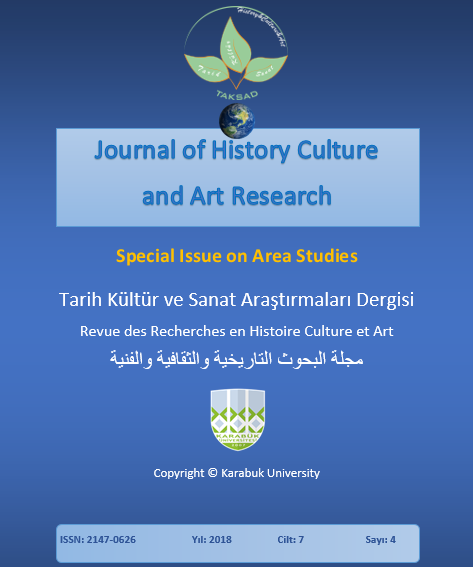Digital Society: The Experience of the Philosophical Understanding of a Problem
DOI:
https://doi.org/10.7596/taksad.v7i4.1856Keywords:
Digital world, Measurement, Harmonization, Figure, Number, Numerical society, Digital society, Numerical world, Ordering, Space.Abstract
The focus of this study is the phenomenon of digital society which being the object of many scientific disciplines, however, still remains outside the philosophical analysis. The urgency of this analysis is dictated by the need for a holistic study of the phenomenon, its panoramic representation in the light of modern social changes. In the study, along with the "digital society", the concepts of "numerical society", "numerical world" and "digital world", "digital dimension" are analyzed, their generic relationship with the concepts "number" and "figure" is established, and also worldview grounds, features and boundaries of the use of these concepts are studied. The theoretical and methodological basis of the study is the works of ancient, medieval and modern mathematicians and philosophers on the number as an instrument of knowledge of the world and society. The author primarily uses the principle of the unity of historical and logical analysis, and relies on the principle of comparativism. The conclusion is drawn that the concept of digital society is the modern state of the information society, while the predicate "digital" reflects the final, limiting state in the development of society and the world as a whole. Thus, modern man comes to antinomy – the desire to measure the unmeasurable.
References
Chizhevsky, A. L. (2015). The solar pulse of life. Comp. A. L. Golovanov. Moscow: AIRIS-press, 2015.
Digital society in the context of personal development: a collection of articles of the International Scientific and Practical Conference (2016). (December 10, 2016, Ufa). Ufa: AERTERNA.
Dmitriev, I. S. (2015). Stubborn Galileo. Moscow: New literary review.
Ershova, R. V. (2016). Digital society as a cultural and historical context of human development: a collection of scientific articles and materials of the international conference "Digital society as a cultural and historical context of human development, February 11-13, 2016, Kolomna. Kolomna: State Social and Humanitarian University.
Khazieva, N. (2017). From One Ontology to the Set of All Possible. Journal of History Culture and Art Research, 6(5), 99-104. DOI: http://dx.doi.org/10.7596/taksad.v6i5.1302
Khazieva, N. O. (2014). Virtual reality as a space of socialization: (socio-philosophical analysis of the problem): dissertation for the degree of Candidate of Philosophy: 09.00.11 – social philosophy. Kazan Federal University. Kazan.
Khazieva, N. O. (2017). Sociocultural world of post-Soviet Russia as a project and a reality. In A.N. Chumakov (eds.), Culture in the context of globalization view from Russia: monograph, (pp.186-199). Collective of authors. Moscow: KNORUS.
Khazieva, N. O.; Khaziev, A. Kh. & Klyshina, E. V. (2014). Virtual as a social space: metaphysical foundations of the phenomenon. Journal of Economics, Law and Sociology, 4, 233-235.
Khazieva, N. O.; Khaziev, A. Kh. & Klyshina, E. V. (2015). Personality in the millstones of virtual reality: philosophical analysis of the problem. Journal of Economics, Law and Sociology, 3, 235-239.
Lenin, V. I. (2010). Children's illness of "leftism" in communism. Moscow: LKI.
Lisi, G. (2008). The eight-dimensional model of the universe. TED: Ideas worth spreading. URL: https://www.ted.com/talks/garrett_lisi_on_his_theory_of_everything?language=en#t-440881.
Lossky, V. (1997). The Mystical Theology of the Eastern Church. Crestwood, New York: SVS Press.
Naidysh, V. M. (2012). The Science of the Ancient Civilizations. Philosophical analysis. Moscow: Alfa-M.
Perminov, V. Ya. (2001). Philosophy and the foundations of mathematics. Moscow: Progress-Traditsiya.
Piatigorsky, A. (2018). Introduction to the Study of Buddhist Philosophy (original publication). URL https://alexanderpiatigorsky.com/texts/books/philosophical-and-buddhologist-books/introduction-to-the-study-of-buddhist-philosophy/introduction-to-the-study-of-buddhist-philosophy-original-publication/
Van Der Waerden, B. (1985). Science Awakening. Mathematics of Ancient Egypt, Babylon and Greece. Oxford University Press.
Zhmud, L. (1989). Pythagoras as a Mathematician. Historia Mathematica, 16, 249-272.
Downloads
Published
How to Cite
Issue
Section
License
All papers licensed under Creative Commons 4.0 CC-BY.- Share — copy and redistribute the material in any medium or format
- Adapt — remix, transform, and build upon the material for any purpose, even commercially.
Under the following terms:
Attribution — You must give appropriate credit, provide a link to the license, and indicate if changes were made. You may do so in any reasonable manner, but not in any way that suggests the licensor endorses you or your use.
- No additional restrictions — You may not apply legal terms or technological measures that legally restrict others from doing anything the license permits.







